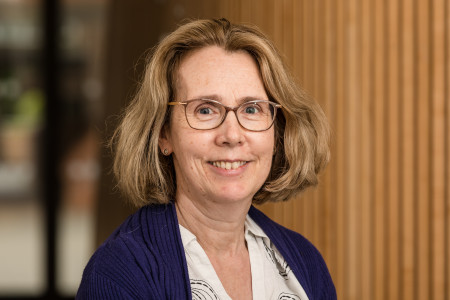
Professor Eleanor Crabb
Head Of School And Professor Of Chemistry Education
School of Life, Health & Chemical Sciences
Biography
Professional biography
I obtained a BSc. in Chemistry at The University of Reading where I stayed to complete a PhD with Professor Robbie Burch in Heterogenous Catalysis. After a brief spell at Reading as a postdoc, I moved to the Laboratoire de Chimie Organique Physique et Cinetique Chimique Appliquees in Montpellier, France to work with Bernard Coq and Francois Figueras as a Postdoctoral Research Fellow. I then returned to the UK to The Open University as a Lecturer in Chemistry, where I have been for the past 30 years and am now a Professor in Chemistry Education.
I am currently the Head of School for the School of Life, Health and Chemical Sciences (since August 2021), having been the Director of Teaching for the School of Life, Health and Chemical Sciences and also the Qualification Director for Natural Sciences (from 2016-2021).
Research interests
My research interests are two-fold: chemistry education research, particularly in the use of eLearning to support students and in delivering online practical experience, and heterogeneous catalysis and nanoparticles, in particular catalyst preparation and characterisation.
My education research/scholarship interests include:
- The design and delivery of context based and remote experimentation
- Online summer schools
- The use of Labcasts to support practical investigation and skill development
- Responsive approaches to personalised learning
- Digital badges to recognise skills development
- The accessibility of online materials
- Improving success rates for credit transfer students entering directly at Level 6
Catalysis and nanomaterials projects include:
- Preparation of gold nanoparticles as radiosensitisers and for drug delivery
- Preparation of mixed oxides as oxygen storage components
- Development of anode electrocatalysts for direct methanol fuel cells (DMFC)
- Design of reformate tolerant anode catalysts for the PEMFC
- Preparation of supported alloy catalysts for oxygen reduction (cathode) for the PEMFC
- Preparation of oxide promoted Pt/alumina catalysts for the preferential oxidation of carbon monoxide in a hydrogen rich stream (PROX)
- Ceria modification of Pt catalysts for the water gas shift reaction
- Preparation of bimetallic catalysts for selective hydrogenation
Please see the Publications tab or visit Open Research Online for further information.
Teaching interests
During my career I have been a member of over 20 module teams, primarily in chemistry and including laboratory schools.
Previously, as the Director of Teaching for the School of Life, Health and Chemical Sciences I chaired the School's Board of Studies and oversaw the undergraduate and taught postgraduate curriculum within the School. I was also the Qualification Director for Natural Sciences, and chaired the Cluster Examination and Assessment Board for students on all pathways within our Sciences qualifications.
Prior to this I was the Associate Programme Director for chemistry and analytical science overseeing the Chemistry and analytical sciences pathway of the BSc Natural Science.
I have been involved in the production of a number of our modules, most recently as the production chair for S315, Chemistry: further concepts and applications - our 60 credit chemistry module at level 6. This module covers all three traditional areas of chemistry and is delivered entirely online.
Prior to this I was the production team chair for S347 Metals and Life, one of the predecessor modules for S315, which copublished two texts with the Royal Society of Chemistry.
I wasalso oversaw the production of many of the online investigations in SXC288 Practical Science: Chemistry and analytical science. I was a member of the production team on the physical chemistry course and author of a case study on "The Three-way Catalytic convertor" delivered previously on OpenLearn).
I have particular interests in online learning including:
- delivering practical work online
- online classrooms
- quizzes
- accessibility issues
and have eSTEeM projects in some of these areas.
Projects
Research enablement and researcher development in the chemical sciences
Grant from the Royal Society of Chemistry to support research enablement and researcher development in the chemical sciences in 2020 in light of the impact of COVID-19. Funds will be used to support activities to support undergraduate research; potential activities could include undergraduate research projects, virtual conferences, seminars or competitions organised by/for undergraduates, postgraduates or postdocs, remote research projects e.g. computational or literature review, researcher development tools or projects such as online training or development of outreach or teaching resources. Feedback will be provided to the RSC in December 2020 to indicate how the funds have been spent.
Publications
Book
Journal Article
A Cocurricular Context-Based Enrichment Program to Enhance Scientific Skills Development (2024)
Confirmation of a Nanohybrid Shish-Kebab (NHSK) Structure in Composites of PET and MWCNTs (2017)
Practical science at a distance (2015)
Reduction properties of Ce in CeOx/Pt/Al2O3 catalysts (2015)
In Situ XAS Studies of Core-Shell PEM Fuel Cell Catalysts: The Opportunities and Challenges (2011)
In situ Ru K-edge EXAFS of CO adsorption on a Ru modified Pt/C fuel cell catalyst (2009)
Impact of PtRu anode catalyst degradation on DMFC MEA performance (2008)
To alloy or not to alloy? Cr modified Pt/C catalysts for PEM fuel cells (2008)
Titanium-doped γ-Fe2O3: Reduction and oxidation properties (2004)
Controlled modification of carbon supported platinum electrocatalysts by Mo (2002)
Synthesis and characterisation of carbon-supported PtGe electrocatalysts for CO oxidation (2001)